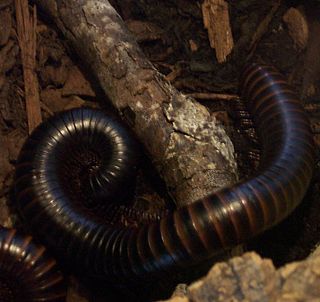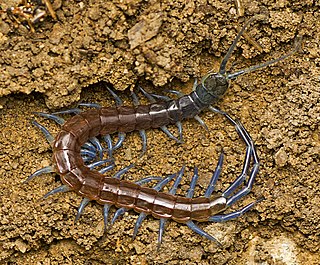
The March of Tuscany was a march of the Kingdom of Italy and the Holy Roman Empire during the Middle Ages. Located in northwestern central Italy, it bordered the Papal States to the south, the Ligurian Sea to the west and Lombardy to the north. It comprised a collection of counties, largely in the valley of the River Arno, originally centered on Lucca.

Cormocephalus is a genus of centipedes of the family Scolopendridae, containing the following species:

Lolita is a 1955 novel written by Russian-American novelist Vladimir Nabokov that addresses the controversial subject of hebephilia. The protagonist is a French literature professor who moves to New England and writes under the pseudonym Humbert Humbert. He describes his obsession with a 12-year-old "nymphet", Dolores Haze, whom he kidnaps and sexually abuses after becoming her stepfather. Privately, he calls her "Lolita", the Spanish nickname for Dolores. The novel was originally written in English, but fear of censorship in the U.S. and Britain led to it being first published in Paris, France, in 1955 by Olympia Press.

Spirostreptus is a genus of giant millipedes of the family Spirostreptidae. It contains the following species:

Orthoporus is a genus of spirostreptid millipedes, containing around 80 species, distributed from the southern United States to Brazil and Argentina.

Julidae is a family of millipedes in the order Julida, containing more than 600 species in around 20 genera. Its members are largely confined to the Western Palaearctic, with only a few species extending into the Oriental and Afrotropical realms. They are united by a characteristic form of the mouthparts, and are classified in the superfamily Juloidea of the order Julida, alongside the families Trichoblaniulidae, Rhopaloiulidae and Trichonemasomatidae.

Julus is a genus of millipedes in the family Julidae, containing the following species:

Scolopendra hardwickei, the Indian tiger centipede, is a species of centipede in the family Scolopendridae.
Mecistocephalus heteropus is a species of centipedes in the family Mecistocephalidae. It is endemic to Sri Lanka. This species has 49 pairs of legs.
Singhalorthomorpha serrulata, is a species of millipedes in the family Paradoxosomatidae. It is endemic to Sri Lanka, first found from Nuwara Eliya.

Geophilus is a large, heterogeneous genus of soil centipedes in the family Geophilidae largely considered to be synonymous with Brachygeophilus. The generic name first appeared in Brewster's Edinburgh Encyclopaedia in 1814 as Geophilus electricus. This genus has a Holarctic distribution.

Anoplodesmus is a genus of millipedes. It is one of the most species rich genera in the family Paradoxosomatidae, with over 40 described species distributed from India and Nepal to China and Southeast Asia, as well as the Mascarene Islands and Fiji.
Sphaeriodesmidae is a family of flat-backed millipedes in the order Polydesmida. There are about 15 genera and at least 90 described species in Sphaeriodesmidae.
Akamptogonus is a genus of flat-backed millipedes in the family Paradoxosomatidae. There are about 11 described species in Akamptogonus.
Chondromorpha is a genus of millipedes belonging to the family Paradoxosomatidae.
Stenodesmus is a genus of millipedes belonging to the family Xystodesmidae.

Rhysida is a large genus of Scolopendromorph centipedes in the subfamily Otostigminae. It is the second largest genus in the subfamily Otostigminae, with species found in the Neotropics, Indo-Malaya, and Africa. It shares some morphological characteristics with the genus Alluropus, and its phylogeny in the subfamily Otostigminae is somewhat uncertain.

Otostigmus is a genus of centipedes in the family Scolopendridae. It was first described by Swedish naturalist Carl Oscar von Porat in 1876. The genus as a whole comprises around 157 species, found primarily in the Neotropics.
Orphnaeus is a genus of centipedes in the family Oryidae. This genus was described by Danish entomologist Frederik Vilhelm August Meinert in 1870. Centipedes in this genus are found in tropical regions.

Otostigminae is a large subfamily of centipedes, containing nearly half of all species in the family Scolopendridae. Members of this subfamily are abundant and widespread throughout the tropical and subtropical regions of the world, mostly in Africa, Asia, and Australia.












